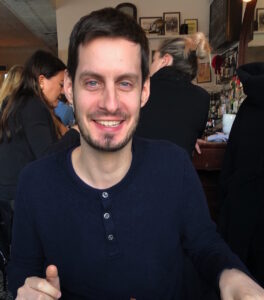Director Ari Aster’s new film Eddington is a snapshot of life in small town New Mexico during the spring and summer of 2020, but the film is only superficially about Covid and Black Lives Matter. On a deeper level it is a portrait of our social media drenched culture–a culture where everyone is on their phones all of the time. It shows how we have become a society where the narratives on which we ground our identities are no longer shaped by a connection to place—our local communities, relationships, and environment—but by the algorithms of our screens. And in the end, it shows how this uprooting of identity leads to the breakdown of social structure and, ultimately, to violence.
The key motif in Eddington is the data center being built in the town by a large technology/media conglomerate. It is this data center, always humming away in the background but never taking center stage, that represents the technological environment in which the film’s characters are immersed. This environment of screens leads each of them into their own algorithm-crafted reality, to the point at which there is no longer mutual understanding between any of them.
When I saw Eddington a few months ago, the collective energy of the movie theater after it ended was a feeling of disorientation “What was that? What did we just watch?” There is a sense of incoherence in the film, and I would argue that this is purposeful, because this is exactly what is happening in our world as we are all glued to our screens, having our own individual “truths” continuously validated and reinforced by algorithms. For each character in the film, the reality that they perceive through their screens becomes the reality of their world. For example, the protagonist Joe Cross is seen watching a clip of “Antifa” rioters with the caption that they are funded by George Soros. By the film’s end Joe has come to live in a reality in which he is fighting against the well-funded and violent army of Antifa. Joe’s wife believes that the world is controlled by a secret cabal of evil pedophiles and that she needs to unlock her memories of how she was abused as a child and join with others who are fighting back against this evil; all of this inspired by her own algorithm-influenced reality. Of course, the one constant for all of the characters is the omnipresent data center, representing the technological environment that breaks down shared narratives and meaning while simultaneously allowing everyone to live in their own separate truth.
In a recent interview, the director Ari Aster pointed to the great media theorist Marshall McLuhan as one of his influences behind the film. McLuhan argued that our technologies (especially our media and communication technologies) shape our environment as well as the response of our central nervous system and our subconscious to that environment. It is impossible for us to understand any social or cultural change without grasping that our media technologies act as environments. Just as fish are unaware of the water that constitutes their environment, so too are we unaware of how deeply technological media frame our perceptions and our world and shape the basis of what we are. One of McLuhan’s most important insights is that because we are unaware of and not adapted to the changes brought about by our new electronic environment, we unconsciously revert to tribal, instinctual, and even violent behavior. The electronic media environment threatens our identity on such a core level that we lose our sense of who we are and what our place is. As a result, we cling tighter and tighter to the manufactured identities in which our screen worlds trap us.
The stories with which they make sense of their lives are no longer rooted in the place that they live, the small New Mexican town, or in anything beyond the narratives of their screens.
The end of the film shows us the final stage of media saturation, what happens to us when our screens become our entire world—the breakdown into tribalized violence. The violence at the end of Eddington is a result of the characters’ loss of any sense of narrative cohesion in which to ground their identities. The stories with which they make sense of their lives are no longer rooted in the place that they live, the small New Mexican town, or in anything beyond the narratives of their screens; and as a result they are pitted against each other in antithetical and antagonistic tribes.
Eddington is not a documentary, it is a work of fiction, but unfortunately, it is not just a metaphor. The world that it portrays is the world that we live in now—a world in which we are all struggling to find a sense of identity and retreating further and further into tribalism and us vs. them thinking via our screens.
The recent murder of right-wing political commentator Charlie Kirk is a terrifying example of tribalized violence erupting into the real world from the algorithms of our screens. I was only passingly familiar with Kirk before his assassination, but I’ve since watched a number of his talks. I don’t agree with everything I’ve heard him say, but to me he seems to have been a quite reasonable commentator. It is important to remember, however, that my understanding of him and his messages is shaped by what my algorithms show me and my preconceived ideas about what he has to offer. There are so many videos of him, so much content, that our individualized algorithms will craft what we see to validate the views we are already inclined towards and, of course, to keep us glued to our screens. The facts about Kirk can be shaped into a variety of different truths. There are other narratives, other realities from my own, in which Kirk was a profound and even existential threat. There is the narrative in which Kirkwas spearheading the fascist takeover of the United States, and this reality is 100 percent real for those who are living in it. This is what our social media environment now does—it facilitates us living in fully formed realities of our own. The deluge of data and information in the social media environment does not bring us closer to (capital-T) Truth. Rather, it allows each of us to live in our OWN truth. We are part of the same society, but our understanding of what is true and what is real now varies wildly from person to person.
As another great twentieth-century philosopher René Girard said, “even the most violent persons believe that they are always reacting to a violence committed in the first place by someone else.” A reality in which Charlie Kirk, or Donald Trump, or whoever it may be, is seen as an existential threat, is a reality in which violence becomes one possible, and even acceptable, response to that threat.
The interconnected world of the internet is actually a world in which people are lonelier than ever and have less opportunity to find meaning in their lives. The connection that social media gives us is fragmentary. All of this leads to a climate of profound existential anxiety, where tribalism and violence become acceptable options (even if only subconsciously) to assuage this existential pain.
It is important for us to recognize how our screen-saturated world leads us into tribalized violence. In the midst of this great fragmentation of reality, there are some truths with which we can still hold onto and share. There are identities and relationships that can transcend the electronic media environment. For example, in the Gospel, we are all called to love our neighbors AND our enemies, and to forgive those who wrong us. These are things that we can strive to do, regardless of what we believe to be true about our world from the understandings we have crafted from our screens. To follow these callings is always easier said than done, but attempting to do so can also give us a grounding for our identity that does not depend on screen-shaped narratives.
Kudos to Ari Aster and his film Eddington for showing the truth of what is happening to us in our social media saturated world. Understanding our environment of screens is an important first step. How we respond and behave in this world is the next one, and it is up to us to choose.
Image via PickPik.






